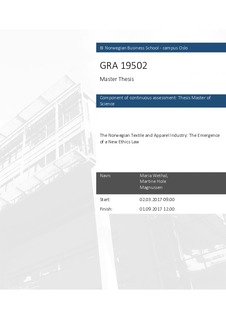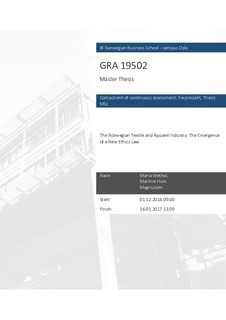| dc.description.abstract | To this date, the majority of textile and apparel companies worldwide have strict
secrecy around their suppliers and production facilities, and consumers have few
rights in terms of access to and knowledge of how goods are produced. As a
response, “Framtiden i Våre Hender” initiated a petition for an ethics law in 2015,
which are now up for debate within the Norwegian Government. The goal of this
law is to give consumers and organisations the right to request information
regarding the working conditions under which goods are manufactured.
The purpose of this thesis was to further explore the proposed Norwegian ethics
law, and its effect on consumer behaviour. As trust is an important element in
influencing consumer behaviour, we investigated whether trust have an effect on
consumers’ behavioural intentions. In addition, involvement with social
consumption was investigated as a source strengthening this relationship. The
industry tested in this thesis is the textile and apparel industry, social consumption
encompasses consumers’ interests in ethical purchasing and corporate social
responsibility, the behavioural intentions are defined in terms of a) seeking for
additional information and b) avoiding repurchasing, and trust is measured by two
dimensions; benevolence and credibility.
Through a within-subjects design, this thesis identified that consumers were more
willing to seek additional information, with the availability of an ethics law, when
the firm was perceived as less benevolent and credible. However, we revealed that
less trust in the benevolence- and credibility of the firm had a low explanation rate
towards consumers’ willingness to avoid repurchasing from the brand. Hence, we
recommend marketing managers to increase transparency and factory list
disclosure, which will help in building and maintaining their relationship with the
consumers, in addition to reinforce its reputation as a trustworthy party. | nb_NO |

